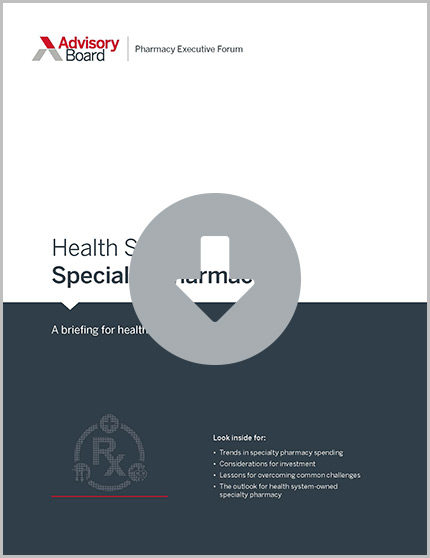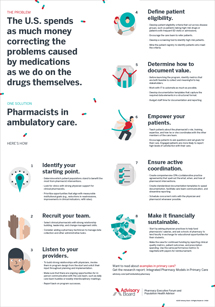Auto logout in seconds.
Continue LogoutTwo pharmaceutical consultants have been quietly pushing a business strategy to struggling pharmaceutical companies that is linked to significant price hikes for some prescription drugs, Jared Hopkins and Andrew Martin report for Bloomberg.
Upcoming webconference: 5 things you need to know about specialty pharmacy strategy
According to Bloomberg, the duo—Todd Smith, chair and CEO of Novum Pharma, and Benjamin Bove, an officer at Novum, which the two helped found—have held jobs and consultant roles at several pharmaceutical companies in recent years.
Bloomberg spoke with 19 former employees from seven of the companies where Smith and Bove worked or consulted to learn about their sales strategies. The sources, Bloomberg reports, requested anonymity because they either had signed nondisclosure agreements or did not want to jeopardize professional relationships.
Smith and Bove declined to be interviewed by Bloomberg, but Novum defended the approach as a "patient-access-centered model" that lowers prices for consumers.
Inside the business model linked with higher Rx prices
According to Bloomberg, while the granular details of the business strategy are "murky," it hinges on reducing patients' copays for prescription drugs to nearly $0 and easing the prescribing process for providers, in part by using specialty pharmacies, all while maintaining high wholesale prices.
According to Bloomberg, specialty pharmacies typically are used for complicated or costly drugs to secure insurance coverage and assist patients with prescription refills. A review of Illinois state and court records show Smith and Bove launched their own specialty pharmacy in 2014 when both worked at a pharmaceutical company.
A source familiar with the duo's business strategy said it involves using data analytics to find holes in the insurance system—such as generous health plans or insurers that are more likely to cover costly but little-used drugs—to get certain drugs covered. The data also are used to target providers that are likely to prescribe the drugs, according to former employees.
While it is not known how many companies for which Smith and Bove have consulted, Bloomberg identified at several pharmaceutical companies that worked with the pair and later hiked the prices of some prescription drugs by as much as 4,116%.
For instance, Bloomberg reports that the wholesale prices of Iroko Pharmaceuticals' arthritis drug Indocin nearly tripled in January, reaching $2,550 for 30 suppositories (three former employees said Smith and Bove began working with the company in 2017). In addition, the wholesale prices of Kaleo's naloxone auto injector Evzio increased from $575 in 2014 to $4,100 in 2016—even though the product in 2016 was available at a higher dosage than it was in 2014 (former employees said the duo began consulting with Kaloe in 2015).
Some say the strategy helps patients access drugs, but others say it drives up overall costs
According to Bloomberg, Smith and Boven's business strategy reflects a broader drug pricing trend that Trump administration officials and other industry experts have said unjustly raises prescription drug prices.
Stephen Schondelmeyer, a professor of pharmaceutical economics at the University of Minnesota, said, "It's totally a wrong way to frame the issue to say it's free to the patient" when the strategy ultimately is "ripping people off."
Michael Rea, CEO of Rx Savings Solutions, said, "These sophisticated traps are designed to pay off certain members of the supply chain in a way that exploits the employer, the insurance company, and the consumer."
But the pharmaceutical companies defended their business practices. Rand Walton, a spokesperson for Novum Pharma, called the business strategy a "patient-access-centered model" that relies on a "creative approach to ensure physicians and patients are not encumbered by the current broken system." Walton said the business strategy does not involve identifying or targeting specific insurance plans.
Kaleo also defended its business strategy, saying, "In our view, the most important price is the price to the patient." The company added, "Since launching Kaleo's enhanced patient-access program in 2016, more Americans can obtain naloxone for $0 today than ever before." The company also noted that it no longer works with Smith or Bove (Hopkins/Martin, Bloomberg, 4/6).
Upcoming webcon: 5 things you need to know about specialty pharmacy strategy
Learn how the specialty pharmacy landscape is changing and what health systems must do to manage care around these high-cost drugs.
Don't miss out on the latest Advisory Board insights
Create your free account to access 1 resource, including the latest research and webinars.
Want access without creating an account?
You have 1 free members-only resource remaining this month.
1 free members-only resources remaining
1 free members-only resources remaining
You've reached your limit of free insights
Become a member to access all of Advisory Board's resources, events, and experts
Never miss out on the latest innovative health care content tailored to you.
Benefits include:
You've reached your limit of free insights
Become a member to access all of Advisory Board's resources, events, and experts
Never miss out on the latest innovative health care content tailored to you.
Benefits include:
This content is available through your Curated Research partnership with Advisory Board. Click on ‘view this resource’ to read the full piece
Email ask@advisory.com to learn more
Click on ‘Become a Member’ to learn about the benefits of a Full-Access partnership with Advisory Board
Never miss out on the latest innovative health care content tailored to you.
Benefits Include:
This is for members only. Learn more.
Click on ‘Become a Member’ to learn about the benefits of a Full-Access partnership with Advisory Board
Never miss out on the latest innovative health care content tailored to you.


